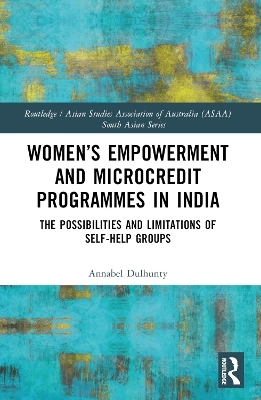
Women’s Empowerment and Microcredit Programmes in India
The Possibilities and Limitations of Self-Help Groups
Seiten
2024
Routledge (Verlag)
978-1-032-41130-9 (ISBN)
Routledge (Verlag)
978-1-032-41130-9 (ISBN)
- Lieferbar (Termin unbekannt)
- Versandkostenfrei
- Auch auf Rechnung
- Artikel merken
This book examines the value of microcredit-based self-help groups (SHGs) for women in India and provides an alternative model for women’s empowerment programming. It will be of interest to scholars in development studies, anthropology, sociology, gender studies and public policy and Asian Studies.
Women’s Empowerment and Microcredit Programs in India examines the value of microcredit-based self-help groups (SHGs) for women in India and provides an alternative model for women’s empowerment programming.
The microcredit sector continues to boom globally - with private investors, governments and multilateral financial institutions all investing substantial amounts in self-help group programming. Nowhere is this more evident than in India, where the industry has further been deregulated in recent years. Much of the rationale for increased investment in microcredit is based on the idea that it improves ‘women’s empowerment’. But is this true? Researchers have fiercely debated the value of microcredit programs for women, with some arguing that it is exploitative, and others contending that it is empowering. This book provides new insights into women’s empowerment and microcredit programming, elaborating on the themes of power, dignity, mobility and solidarity. It takes a nuanced view of the complexities surrounding self-help group programming and women’s empowerment and argues that the model of microcredit self-help group programming is key to whether it helps or harms women.
By focusing on the experiences and voices of microcredit self-help group members in West Bengal, India, this book elaborates on the idea of microcredit models existing on a continuum, from ‘smart economics’ to more holistic feminist versions of programming. It will be of interest to scholars in development studies, anthropology, sociology, gender studies and public policy and Asian Studies.
Women’s Empowerment and Microcredit Programs in India examines the value of microcredit-based self-help groups (SHGs) for women in India and provides an alternative model for women’s empowerment programming.
The microcredit sector continues to boom globally - with private investors, governments and multilateral financial institutions all investing substantial amounts in self-help group programming. Nowhere is this more evident than in India, where the industry has further been deregulated in recent years. Much of the rationale for increased investment in microcredit is based on the idea that it improves ‘women’s empowerment’. But is this true? Researchers have fiercely debated the value of microcredit programs for women, with some arguing that it is exploitative, and others contending that it is empowering. This book provides new insights into women’s empowerment and microcredit programming, elaborating on the themes of power, dignity, mobility and solidarity. It takes a nuanced view of the complexities surrounding self-help group programming and women’s empowerment and argues that the model of microcredit self-help group programming is key to whether it helps or harms women.
By focusing on the experiences and voices of microcredit self-help group members in West Bengal, India, this book elaborates on the idea of microcredit models existing on a continuum, from ‘smart economics’ to more holistic feminist versions of programming. It will be of interest to scholars in development studies, anthropology, sociology, gender studies and public policy and Asian Studies.
Annabel Dulhunty is a Lecturer at the Crawford School of Public Policy at the Australian National University.
Chapter 1. Introduction; Chapter 2. Women’s Empowerment and Feminist Movements; Chapter 3. Feminist Movements in India; Chapter 4. The Microcredit Debate; Chapter 5. Contrasting Models of Microcredit Programming: From Credit Plus to ‘Smart Economics’; Chapter 6. Community Development Frameworks; Chapter 7. The Role of Dignity; Chapter 8. Mobility and the Maintenance of Patriarchy; Chapter 9. Solidarity and Connection; Chapter 10. Conclusions and Recommendations
| Erscheinungsdatum | 05.08.2023 |
|---|---|
| Reihe/Serie | Routledge/Asian Studies Association of Australia ASAA South Asian Series |
| Zusatzinfo | 2 Tables, black and white |
| Verlagsort | London |
| Sprache | englisch |
| Maße | 156 x 234 mm |
| Themenwelt | Sachbuch/Ratgeber ► Beruf / Finanzen / Recht / Wirtschaft ► Geld / Bank / Börse |
| Sozialwissenschaften ► Ethnologie | |
| Sozialwissenschaften ► Soziologie ► Spezielle Soziologien | |
| Wirtschaft ► Volkswirtschaftslehre | |
| ISBN-10 | 1-032-41130-9 / 1032411309 |
| ISBN-13 | 978-1-032-41130-9 / 9781032411309 |
| Zustand | Neuware |
| Informationen gemäß Produktsicherheitsverordnung (GPSR) | |
| Haben Sie eine Frage zum Produkt? |
Mehr entdecken
aus dem Bereich
aus dem Bereich
1000 ganz legale Steuertricks : der Ratgeber für alle Steuerzahler …
Buch | Softcover (2023)
Knaur Taschenbuch (Verlag)
CHF 23,80
das Arbeitsbuch zur Steuererklärung für Rentner und Pensionäre
Buch | Softcover (2024)
Knaur Taschenbuch (Verlag)
CHF 20,95
Steuern, Recht und Finanzen für die zweite Lebenshälfte
Buch | Softcover (2023)
Stiftung Warentest (Verlag)
CHF 31,95


